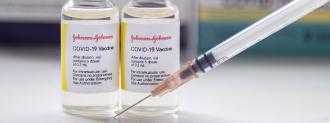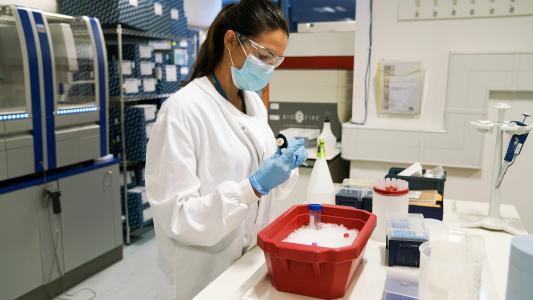The U.S. is one step closer to getting a new COVID-19 vaccine — and this one requires just a single shot.
On February 24, FDA experts confirmed that Johnson and Johnson’s vaccine is safe and effective. The agency is now expected to make a decision within days on whether to issue emergency approval for the vaccine.
Here’s what we know about the one-shot COVID-19 vaccine.
What’s Special About the One-Shot COVID-19 Vaccine?
Because Johnson and Johnson’s vaccine calls for just one shot, every dose can go to protecting a new person.
Moderna’s and Pfizer’s vaccines call for two shots — that means the companies must produce twice as many doses to fully vaccinate the same number of people.
The one-shot COVID-19 vaccine will also be easier to distribute because it can last up to three months in a refrigerator — the two approved vaccines must be frozen until use.
How Does the Vaccine Work?
The two vaccines currently authorized in the U.S. are both mRNA vaccines — those use instructions written in genetic code, wrapped in a lipid container, to trigger immunity to the coronavirus.
Johnson and Johnson’s vaccine is an andenovector vaccine. Instead of a lipid ball, it uses the shell of a common type of virus — an adenovirus — to deliver the instructions for the coronavirus’ spike protein to the body.
Because the virus is just a shell, it can’t replicate itself or cause an infection, but it is enough to train the immune system to recognize the real coronavirus in the future.
How Effective Is Johnson and Johnson’s Vaccine?
Fourteen days after vaccination, the vaccine is about 66% effective at preventing moderate to severe COVID-19.
That’s based on phase 3 trials involving more than 43,000 adults, in eight countries.
The one-shot COVID-19 vaccine was not equally effective in all nations, though — its efficacy in the U.S. was 72%, but in South Africa, where a new strain of the virus has emerged, it was 57% effective.
The vaccines currently approved for use in the U.S. are about 95% effective after two doses, but early data suggest that even one dose of these vaccines may be as high as 85% effective.
How Long Does Immunity Last?
That’s still unknown. The data submitted to the FDA covered about four months, similar to the Moderna and Pfizer studies.
It’s possible people would need a booster shot to follow up the one-shot COVID-19 vaccine in the future, something that Johnson and Johnson is testing now, but only time will tell.
What Are the Side Effects?
The FDA analysis didn’t turn up any safety concerns that would prevent Johnson and Johnson’s vaccine from being authorized.
However, more than a third of people who received the one-shot COVID-19 vaccine did experience one or more of the following side effects: injection site pain, headache, fatigue, and muscle ache.
Less common side effects included nausea and fever. The side effects typically cleared up quickly.
How Many Doses Are Available?
A Johnson and Johnson exec told Congress on February 23 that the company is prepared to ship more than 3 million doses of its vaccine upon authorization.
It expects to deliver a total of 20 million doses by the end of March and 100 million doses total by the end of June.
What’s Next?
A committee of independent advisors is meeting on February 26 to review the FDA experts’ analysis and Johnson and Johnson’s authorization request.
That group will then let the FDA know whether or not it recommends issuing an emergency use authorization for the one-shot COVID-19 vaccine. The FDA will likely make its decision soon after.
We’d love to hear from you! If you have a comment about this article or if you have a tip for a future Freethink story, please email us at [email protected].






